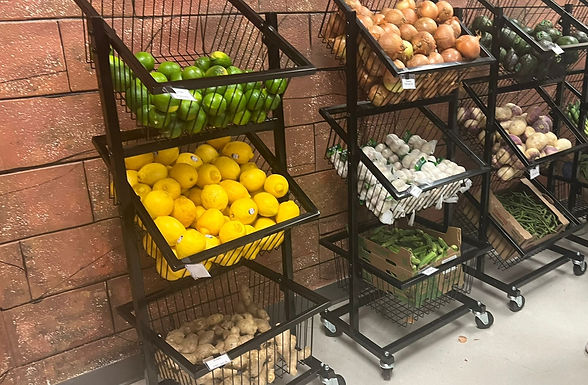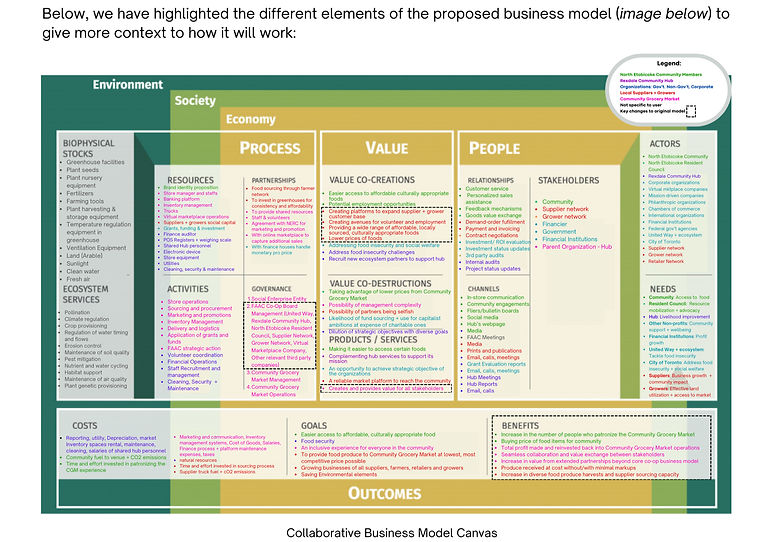Project
Operational Model:
Rexdale Community Grocery Market
Overview
This was a client-based project which was proposed by Rexdale Community Hub, with the brief to provide a Project Charter and a Team Charter for Rexdale Community Grocery Market, with the aim of providing easier access to local, quality, culturally appropriate food for the predominantly low-income, immigrant community оf Rexdale in North Etobicoke.
Challenge
The Grocery Market faces significant challenges in achieving financial and organizational viability, as well as fostering stakeholder contribution and collaboration to ensure it meets community pricing expectations and ultimately becomes a self-sustaining operation.
Solution
The proposed solution is a collaborative business model where the Rexdale Community Hub co-manages and potentially co-owns the Community Grocery Market with key partners. These include fresh produce suppliers, the North Etobicoke Resident Council, United Way, the City of Toronto, and local farmers. A governing board made up of these stakeholders would oversee operations and growth. By combining community demand, the market can reduce operating costs, lower produce prices, and create added value for both the community and its partners.
Discovery
Ideation
Analysis
Development
Intial Brief
Reframed challenge
Solution



.png)
Stakeholder and
Actors Map

The Community Grocery Market resembles the pattern of a multi-sided platform model which brings buyers (the North Etobicoke community member) and grocery suppliers into a physical space, facilitating/enabling affordable groceries for the community while supporting local suppliers. Below is the current business model of the Community Grocery Market.




Functional prioritization and influence on total organization
Look at that price. Tomatoes are not that price at No Frills. - Resident 01, Jamaican
The prices are really expensive for cucumbers and cherry tomatoes in the community grocery market. - Resident 02, Sri Lankan
Fieldwork observation:
There is just one supplier.
United Way has funded the Hub to experiment but there is not a clear mandate.
Various business model exploration- Flourishing business model canvas
In the ever more complex world in which we exist today, it is important for enterprises to recognize their interdependencies with society, the environment and the economy when designing business models. The team used the Flourishing Business Canvas to help us better understand our interdependencies and impact.
1. Produce on Demand Business Model
2. Lowest Price Matching Business Model
3. Collaborative Business Model
Following the three directions explored in the Ideation phase, the model holding the most promise for the Community Grocery Market is the Collaborative Business Model.
The solution involves transforming from the current Multi-sided Business Model to a Collaborative Business Model where the success of the Community Grocery Market is no longer the sole responsibility of the Rexdale Community Hub. Considering the City of Toronto has already given the directive that the Community Grocery Market will need to be incorporated as a Social Enterprise entity, separate from the operations of the Rexdale Community Hub, we see no barriers to this direction.
Two key components of the model will be:


Proposed Solution
Space analysis and research
Ideation
Final Product Development
Ethnography
Prototyping & Journey mapping
Testing



To give more context to how the different stakeholders can collaborate and leverage the value that each of them brings to the table, we have mapped out what the value exchanges can be in a Value Relationship Map on the next page.
This map brings alive the set of benefits that each stakeholder can provide to other identified partners and the set of benefits that they can equally provide.
Value Chain Mapping
.png)



Team with Russ (Manager at Rexdale Community Hub),
Find full report below here